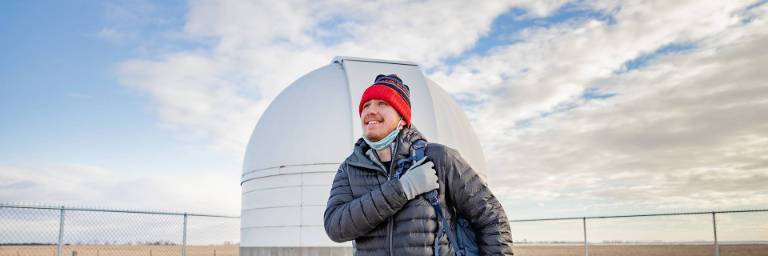Astrophysics Minor
Study astrophysics and understand the workings of the universe at the most fundamental level.
Gain additional knowledge with a minor in Astrophysics and explore the natural laws of the universe.
- Program type:
- Minor
- Format:
- On Campus
- Est. time to complete:
- 1-2 years
- Credit hours:
- 25
Why earn a minor in Astrophysics?
Physics is the foundation for every other science and engineering field. When you study astrophysics at UND, the universe is your classroom.
This minor features our signature combination of hands-on learning, close relationships with faculty and access to modern equipment. You'll be given opportunities to pursue research and teaching assistantships, and various scholarships. Plus, there are many opportunities for financial aid assistance.
What majors pair well with an Astrophysics minor?
Combining an Astrophysics minor with certain majors can deepen your understanding of celestial phenomena, space exploration, and theoretical physics. UND's Astrophysics minor cannot be combined with a major in Physics or minor in Physics; however, here are some bachelor’s degrees that pair well with an Astrophysics minor:
- Aerospace Engineering Degree: Learn about spacecraft design, orbital mechanics, and space exploration, which are directly relevant to astrophysics research.
- Mathematics Degree: Acquire strong math skills necessary for advanced astrophysical calculations and
modeling, such as celestial mechanics and cosmological simulations.
- Computer Science Degree: Develop computational skills essential for analyzing large datasets and running simulations in astrophysics research, as well as programming for data analysis and simulations.
Astrophysics Minor at UND
-
Experience hands-on learning and build close relationships with faculty to discuss career and scholarly goals.
-
Participate in the active research of an array of topics such as dark energy, galaxy clusters and interstellar hydrodynamics.
-
Small classes provide ample opportunity for informal interaction with students and faculty.
-
Prepare yourself for a job in your focus of study in physics/astrophysics and related disciplines.
-
Apply for a variety of astrophysics scholarships available to help you invest in your education.
-
Not sure if astrophysics is right for you? Try taking Introduction to Astrophysics.
